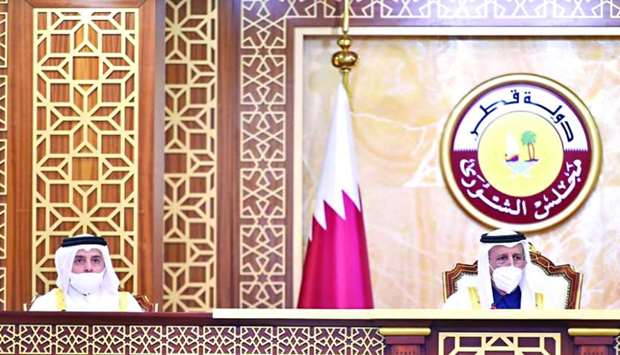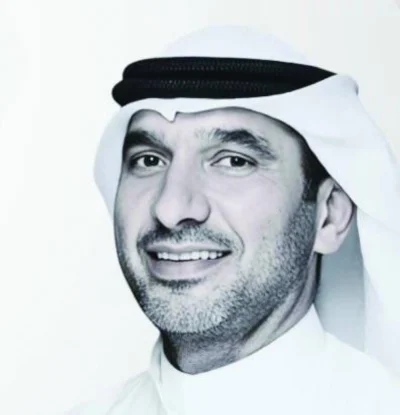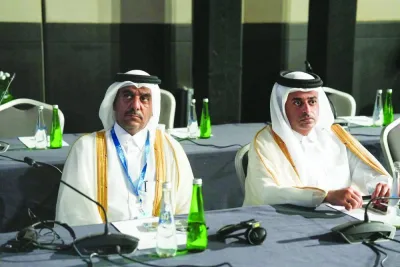The Shura Council held its weekly meeting Monday under the chairmanship of its Speaker HE Ahmed bin Abdullah bin Zaid al-Mahmoud.
At the outset of the session, the Council welcomed the outcome of the GCC Summit, which was held in the Al-Ula Governorate in Saudi Arabia.
The Council expressed its deep pride in the wise policy of His Highness the Amir Sheikh Tamim bin Hamad al-Thani, which contributed to the success achieved by the GCC Summit and its important positive results to consolidate the unity of the GCC ranks, develop the GCC joint action, revive and activate the GCC and spread the spirit of brotherhood, solidarity, understanding, trust and mutual respect among its countries.
The Council renewed the praise for the efforts exerted by the late Sheikh Sabah al-Ahmad al-Jaber al-Sabah to heal the Gulf rift, which were completed by the Amir of Kuwait Sheikh Nawaf al-Ahmad al-Jaber al-Sabah. It also praised the role of the United States in achieving the Gulf reconciliation.
The Shura Council valued the praise by the GCC Supreme Council in the final communique for His Highness the Amir's announcement to hold Shura Council elections in October, and its congratulation to Qatar on the election of HE the Speaker al-Mahmoud as Chairman of the Global Organisation of Parliamentarians Against Corruption (GOPAC) for 2019-2021.
The Council then listened to HE the Minister of Education and Higher Education Dr Mohamed bin Abdul Wahed Ali al-Hammadi who presented the ministry's report on the results of its study of the Council's recommendations on the general debate request presented by a number of the Council's members regarding education and higher education in Qatar.
At the beginning of discussions on the education issues, HE the Speaker extended the sincerest thanks and appreciation to His Highness the Amir for his great interest in everything that achieves prosperity and progress for the country and the citizens, especially education, as a fundamental pillar in human life and a fundamental pillar of Qatar National Vision 2030.
HE al-Mahmoud said that the Council, the government and the society aim to ensure good education and its beneficial outcomes, stressing that the recommendations of the Council aim in short at the formation of a good citizen who believes in his faith and is proud of his country, nation and language.
The recommendations focused on curriculum development by emphasising the Islamic, Arab and national identity of the Qatari society, paying attention to sports and cultural activities, addressing the phenomenon of Qataris' reluctance to pursue the teaching profession, encouraging the private sector to invest in the education sector, addressing the phenomenon of private lessons, and developing appropriate mechanisms with clear standards that guarantees equality in the accreditation and certification of university degrees for Qatari and non-Qatari graduates of foreign universities.
The recommendations also included the necessity to take the needed practical measures to ensure the enrollment of more students with special needs in the educational process, increasing the salaries of mentors given the scientific value they represent and their important role in monitoring the performance of the teachers and developing their skills, reviewing the length of the school year and working go achieve proportionality between the duration of the two academic semesters, and standardising vacations for students between public and private schools.
HE Dr al-Hammadi explained that the general framework of the national educational curriculum is based on strengthening the national identity, instilling the spirit of belonging and consolidating the values and traditions of the Qatari society, in addition to a set of values derived from the Islamic religion, stressing that the national, Arab and Islamic identity is one of the most important principles that the educational curricula aimed to promote.
HE the Minister of Education highlighted the ministry's keenness on discovering the distinctive talents and abilities of male and female students in the early stages of education, noting the implementation of the gifted care policy at the Special Needs Education and Gifted Care Department (the experimental stage) in 13 schools of various stages.
On the basis of scholarships for Qatari students, the minister explained that the scholarships are based on competence and scientific percentage and not on the basis of the entity they work for, whether this entity is governmental or non-governmental.
The Council expressed its deep pride in the wise policy of His Highness the Amir Sheikh Tamim bin Hamad al-Thani, which contributed to the success achieved by the GCC Summit and its important positive results to consolidate the unity of the GCC ranks, develop the GCC joint action, revive and activate the GCC and spread the spirit of brotherhood, solidarity, understanding, trust and mutual respect among its countries.
The Council renewed the praise for the efforts exerted by the late Sheikh Sabah al-Ahmad al-Jaber al-Sabah to heal the Gulf rift, which were completed by the Amir of Kuwait Sheikh Nawaf al-Ahmad al-Jaber al-Sabah. It also praised the role of the United States in achieving the Gulf reconciliation.
The Shura Council valued the praise by the GCC Supreme Council in the final communique for His Highness the Amir's announcement to hold Shura Council elections in October, and its congratulation to Qatar on the election of HE the Speaker al-Mahmoud as Chairman of the Global Organisation of Parliamentarians Against Corruption (GOPAC) for 2019-2021.
The Council then listened to HE the Minister of Education and Higher Education Dr Mohamed bin Abdul Wahed Ali al-Hammadi who presented the ministry's report on the results of its study of the Council's recommendations on the general debate request presented by a number of the Council's members regarding education and higher education in Qatar.
At the beginning of discussions on the education issues, HE the Speaker extended the sincerest thanks and appreciation to His Highness the Amir for his great interest in everything that achieves prosperity and progress for the country and the citizens, especially education, as a fundamental pillar in human life and a fundamental pillar of Qatar National Vision 2030.
HE al-Mahmoud said that the Council, the government and the society aim to ensure good education and its beneficial outcomes, stressing that the recommendations of the Council aim in short at the formation of a good citizen who believes in his faith and is proud of his country, nation and language.
The recommendations focused on curriculum development by emphasising the Islamic, Arab and national identity of the Qatari society, paying attention to sports and cultural activities, addressing the phenomenon of Qataris' reluctance to pursue the teaching profession, encouraging the private sector to invest in the education sector, addressing the phenomenon of private lessons, and developing appropriate mechanisms with clear standards that guarantees equality in the accreditation and certification of university degrees for Qatari and non-Qatari graduates of foreign universities.
The recommendations also included the necessity to take the needed practical measures to ensure the enrollment of more students with special needs in the educational process, increasing the salaries of mentors given the scientific value they represent and their important role in monitoring the performance of the teachers and developing their skills, reviewing the length of the school year and working go achieve proportionality between the duration of the two academic semesters, and standardising vacations for students between public and private schools.
HE Dr al-Hammadi explained that the general framework of the national educational curriculum is based on strengthening the national identity, instilling the spirit of belonging and consolidating the values and traditions of the Qatari society, in addition to a set of values derived from the Islamic religion, stressing that the national, Arab and Islamic identity is one of the most important principles that the educational curricula aimed to promote.
HE the Minister of Education highlighted the ministry's keenness on discovering the distinctive talents and abilities of male and female students in the early stages of education, noting the implementation of the gifted care policy at the Special Needs Education and Gifted Care Department (the experimental stage) in 13 schools of various stages.
On the basis of scholarships for Qatari students, the minister explained that the scholarships are based on competence and scientific percentage and not on the basis of the entity they work for, whether this entity is governmental or non-governmental.



